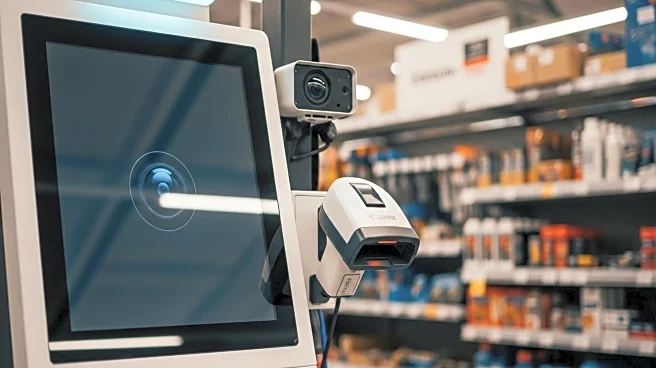What is the story about?
What's Happening?
Home Depot, a major home improvement retailer, is facing a class action lawsuit filed by a customer, Benjamin Jankowski, in Chicago. The lawsuit alleges that Home Depot used facial recognition technology at its self-checkout kiosks without informing customers or obtaining their consent. Jankowski claims he noticed a green square around his face on the kiosk's screen, indicating that his image was being analyzed by an artificial intelligence system. The lawsuit highlights that Home Depot did not provide any signs or warnings about the collection of biometric data, which is a requirement under Illinois' Biometric Information Privacy Act (BIPA). This law mandates companies to inform users clearly if they are collecting biometric data and requires written consent before storing such information. The lawsuit argues that Home Depot's privacy policy does not comply with BIPA, as it lacks a clear data retention limit, stating data will be stored as long as reasonably necessary.
Why It's Important?
The lawsuit against Home Depot underscores the growing concerns over privacy and the use of facial recognition technology in retail environments. Illinois' BIPA is one of the strictest laws in the U.S. regarding biometric data, and this case could set a precedent for how companies handle such information. If successful, the lawsuit could lead to significant financial penalties for Home Depot and impact its reputation, highlighting the importance of transparency in security practices. The case also raises broader questions about the balance between technological advancements for security and the protection of consumer privacy rights. As facial recognition technology becomes more prevalent, companies may face increased scrutiny and legal challenges if they fail to adhere to privacy laws.
What's Next?
If the lawsuit proceeds, Home Depot could face substantial fines, with the plaintiff seeking $1,000 for each negligent violation and $5,000 for each intentional violation of BIPA. The case may prompt Home Depot to revise its privacy policies, especially in states with strict biometric data laws like Illinois. The outcome of this lawsuit could influence other retailers to reassess their use of facial recognition technology and ensure compliance with privacy regulations. Additionally, the case may lead to increased public and legal pressure on companies to be more transparent about their data collection practices.
Beyond the Headlines
The lawsuit against Home Depot highlights the ethical and legal challenges associated with facial recognition technology. As this technology becomes more integrated into everyday life, it raises questions about consent, data security, and the potential for misuse. The case may contribute to a broader debate on the ethical implications of biometric data collection and the need for robust legal frameworks to protect consumer privacy. It also emphasizes the importance of companies being proactive in addressing privacy concerns to maintain consumer trust and avoid legal repercussions.















